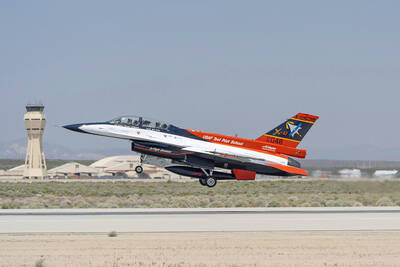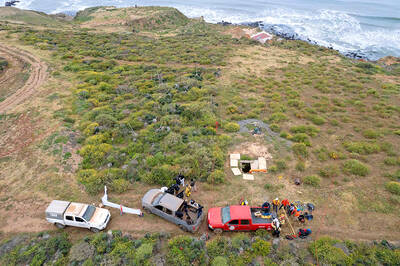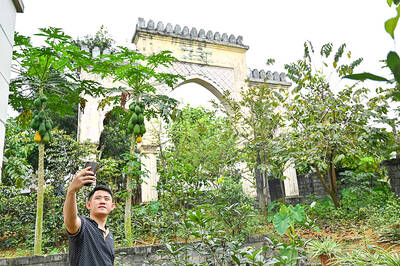A panel of experts commissioned by the WHO has criticized China and other countries for not moving to stem the initial outbreak of COVID-19 earlier, and questioned whether the UN health agency should have labeled it a pandemic sooner.
In a report issued on Monday, the panel, led by former Liberian president Ellen Johnson Sirleaf and former New Zealand prime minister Helen Clark, said that there were “lost opportunities to apply basic public health measures at the earliest opportunity” and that Chinese authorities could have applied their efforts “more forcefully” in January last year shortly after the novel coronavirus began sickening clusters of people.
“The reality is that only a minority of countries took full advantage of the information available to them to respond to the evidence of an emerging pandemic,” the panel said.

Photo: AFP
The experts also wondered why the WHO did not declare a global public health emergency sooner.
The UN health agency convened its emergency committee on Jan. 22, but did not characterize the emerging pandemic as an international emergency until a week later.
At the time, the WHO said its expert committee was divided on whether a global emergency should be declared.
“One more question is whether it would have helped if WHO used the word pandemic earlier than it did,” the panel said.
The WHO did not describe the COVID-19 outbreak as a pandemic until March 11, weeks after the virus had begun causing explosive outbreaks in numerous continents, meeting the agency’s own definition for a flu pandemic.
As COVID-19 began spreading across the globe, the WHO’s top experts disputed how infectious it was, saying it was not as contagious as flu and that people without symptoms only rarely spread the virus.
Scientists have since concluded that COVID-19 transmits even quicker than the flu and that a significant proportion of spread is from people who do not appear to be sick.
Over the past year, the WHO has come under heavy criticism for its handling of the response to COVID-19. US President Trump slammed the UN health agency for “colluding” with China to cover up the extent of the initial outbreak before halting US funding for the WHO and pulling the country out of the organization.
An Associated Press investigation in June last year found that the WHO repeatedly lauded China in public, while officials privately complained that Chinese officials stalled on sharing critical epidemic information with them.
Although the panel concluded that “many countries took minimal action to prevent the spread [of COVID-19] internally and internationally,” it did not name specific countries.
It also declined to call out the WHO for its failure to more sharply criticize countries for their missteps instead of lauding countries for their response efforts.

With the midday sun blazing, an experimental orange and white F-16 fighter jet launched with a familiar roar that is a hallmark of US airpower, but the aerial combat that followed was unlike any other: This F-16 was controlled by artificial intelligence (AI), not a human pilot, and riding in the front seat was US Secretary of the Air Force Frank Kendall. AI marks one of the biggest advances in military aviation since the introduction of stealth in the early 1990s, and the US Air Force has aggressively leaned in. Even though the technology is not fully developed, the service is planning

INTERNATIONAL PROBE: Australian and US authorities were helping coordinate the investigation of the case, which follows the 2015 murder of Australian surfers in Mexico Three bodies were found in Mexico’s Baja California state, the FBI said on Friday, days after two Australians and an American went missing during a surfing trip in an area hit by cartel violence. Authorities used a pulley system to hoist what appeared to be lifeless bodies covered in mud from a shaft on a cliff high above the Pacific. “We confirm there were three individuals found deceased in Santo Tomas, Baja California,” a statement from the FBI’s office in San Diego, California, said without providing the identities of the victims. Australian brothers Jake and Callum Robinson and their American friend Jack Carter

Le Tuan Binh keeps his Moroccan soldier father’s tombstone at his village home north of Hanoi, a treasured reminder of a man whose community in Vietnam has been largely forgotten. Mzid Ben Ali, or “Mohammed” as Binh calls him, was one of tens of thousands of North Africans who served in the French army as it battled to maintain its colonial rule of Indochina. He fought for France against the Viet Minh independence movement in the 1950s, before leaving the military — as either a defector or a captive — and making a life for himself in Vietnam. “It’s very emotional for me,”

The Chinese Communist Party’s (CCP) Central Committee is to gather in July for a key meeting known as a plenum, the third since the body of elite decisionmakers was elected in 2022, focusing on reforms amid “challenges” at home and complexities broad. Plenums are important events on China’s political calendar that require the attendance of all of the Central Committee, comprising 205 members and 171 alternate members with Chinese President Xi Jinping (習近平) at the helm. The Central Committee typically holds seven plenums between party congresses, which are held once every five years. The current central committee members were elected at the